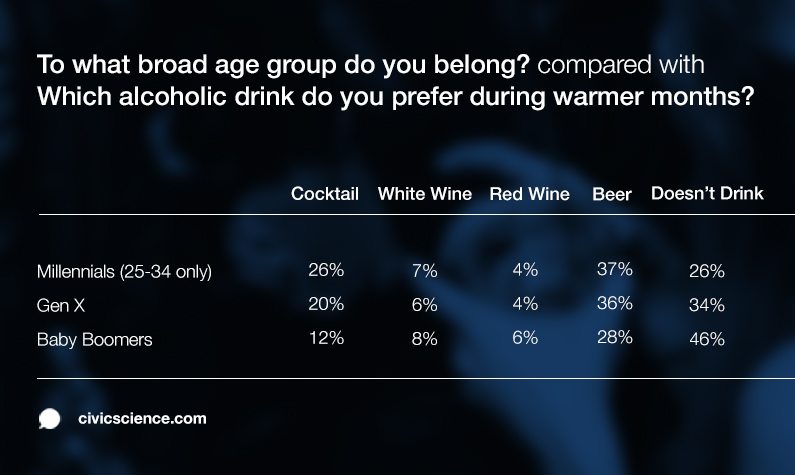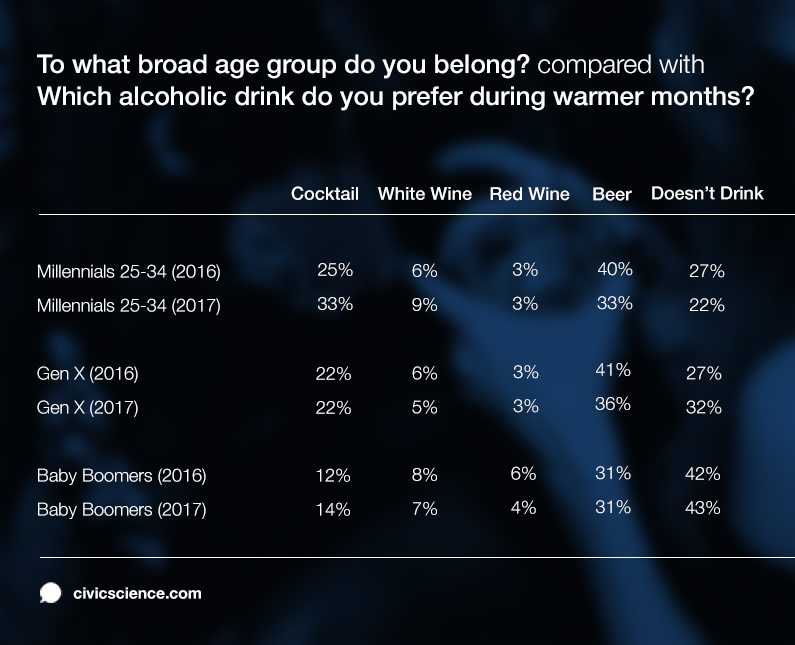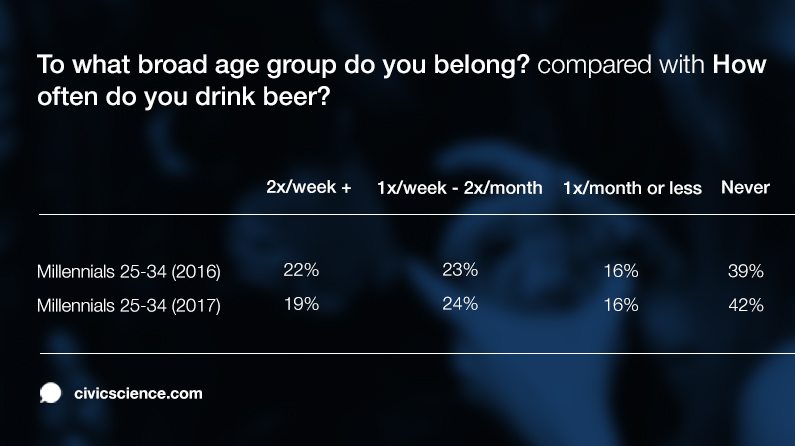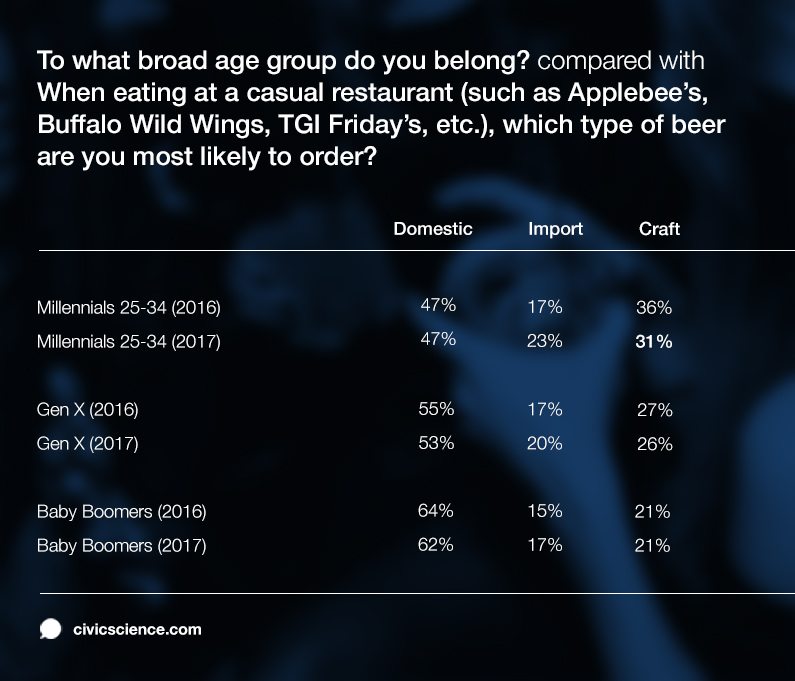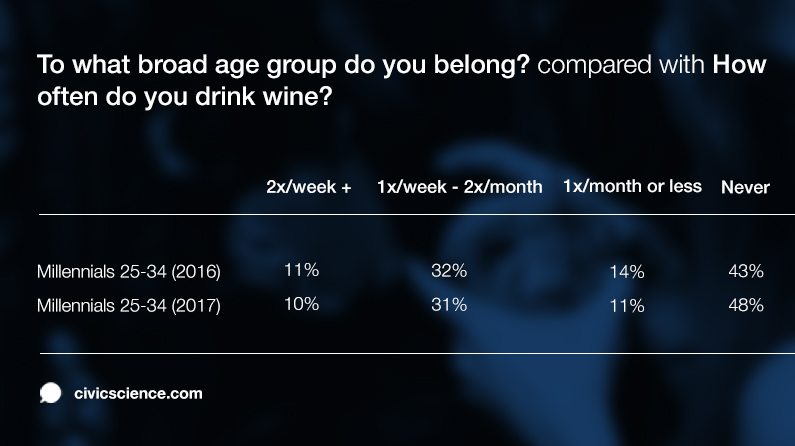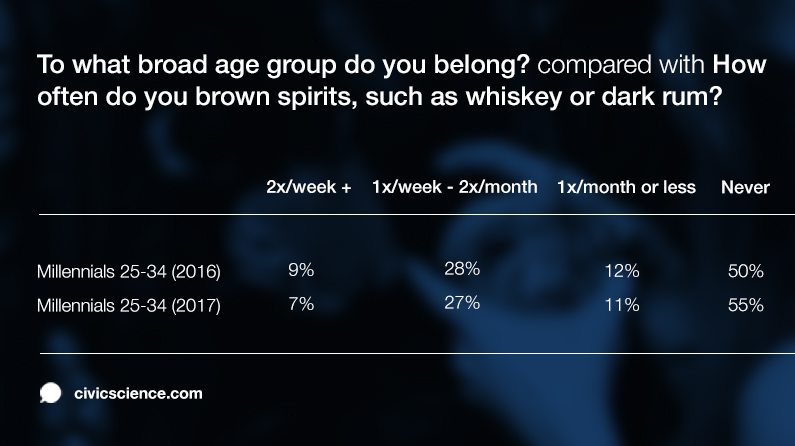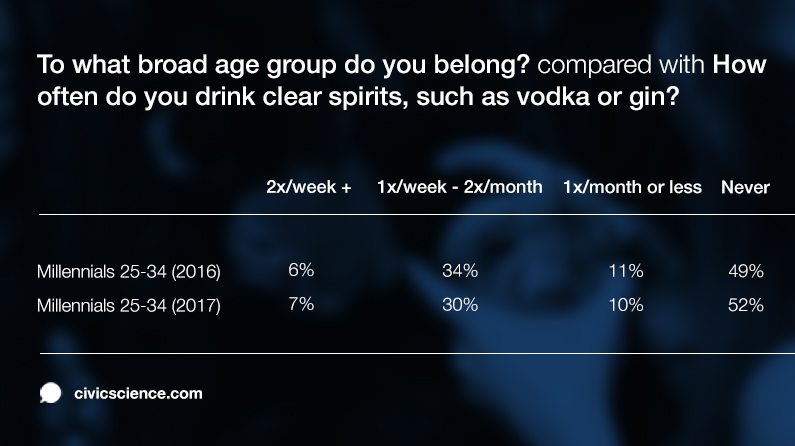The Gist: When we break down alcohol consumption and frequency by alcohol type, Millennials report to be drinking less alcohol, in general, this year as compared to last year. Could this indicate a cultural shift on the horizon?
When researching for our recent article, X Insights about Generation X, we discovered something eye-opening.
Millennials of the legal drinking age appear to drink way more alcohol (during the warmer months) than any other eligible age group.
I’ll note here that we’re looking at a segment of Millennials 25 and older. This should mean that the increased drinking that often accompanies a 21st birthday has likely had some time to fizzle out. By looking at older Millennials, we are more likely to see data of an actual generational or cultural trend.
We broke this down by year to see if this was a newer trend or a constant, and found that between 2016 and 2017, Millennials who say they don’t drink alcohol (during the warmer months) decreased by 5 percentage points. So it looks like Millennials are more likely to drink alcohol during the warmer months in 2017 than 2016 – but that’s not the whole story.
To get to the bottom of this, and see exactly where Millennials are cutting or increasing their alcohol consumption, we broke down alcohol by type, and compared 2016 drinking trends to 2017.
THE WARMER MONTHS
Let’s refer back to the graphs above for a quick hypothesis and overview.
It immediately seems clear that beer is out, at least during the warmer months. Millennials’ beer consumption decreased by 7 percentage points between 2016 and 2017.
Millennials who say they prefer to drink cocktails during the warmer months increased by 8 percentage points between 2016 and 2017. Millennials drinking red wine decreased by 1 percentage point, and those drinking white wine increased by 3 percentage points.
If we had to guess, based on the data, we’d say consumption of spirits and wine increased for Millennials between 2016 and 2017, regardless of the season, and that beer consumption decreased.
Turns out, that’s wrong.
BEER
Between 2016 and 2017, the percent of Millennials who say they never drink beer increased by 3 percentage points, and those who drink beer once a month or less increased by 2 percentage points.
It appears that Millennials are at least scaling back if not quitting altogether. But that’s not the end of the beer story.
CRAFT BEER
So, what about craft beer, the holy grail of Millennial hipster giggle water?
Legal Millennials still drink much more craft beer than other generations (at casual restaurants, so we understand this is an imperfect proxy, but still worth a look). However, they scaled back between 2016 and 2017.
Consumption of imported beer increased by 6 percentage points between 2016 and 2017.
Is this a new trend? Is craft beer out with the cool kids, and is imported beer in? We’ll be looking closer at craft beer in the future, so keep an eye out for that.
WINE
Wine also appears to be losing favor among Millennials.
Millennial wine drinkers decreased by 5 percentage points between 2016 and 2017, and level of frequency for wine drinkers decreased as well.
SPIRITS
With the increase in Millennials drinking cocktails during the warmer months, we expected to see an increase in overall spirits consumption, but we didn’t.
In fact, Millennials who say they never drink brown spirits or clear spirits increased by 5 percentage points and 3 percentage points, respectively.
The frequency of Millennials drinking spirits decreased all across the board.
So, what’s going on with Millennials and alcohol?
Though the data appear contradictory on the surface, the numbers are potentially very telling.
What this seems to say is that, in the summer, beer is out with Millennials, and cocktails are in. However, the occasional, or single summer cocktail doesn’t appear to translate into a habit or even register as an occurrence when considering specific alcohol consumption and frequency.
Some questions still remain: Are Millennials drinking more but not aware of it? Or is it in vogue to downplay alcohol consumption? Considering the general sentiment about this generation, I can imagine a desire to feel more responsible by either drinking less or reporting drinking less. We’ll have to collect some more data, though, before we conclude any kind of sentiment.
A dramatic shift does appear to be on the horizon, however. The question is, what is it?
